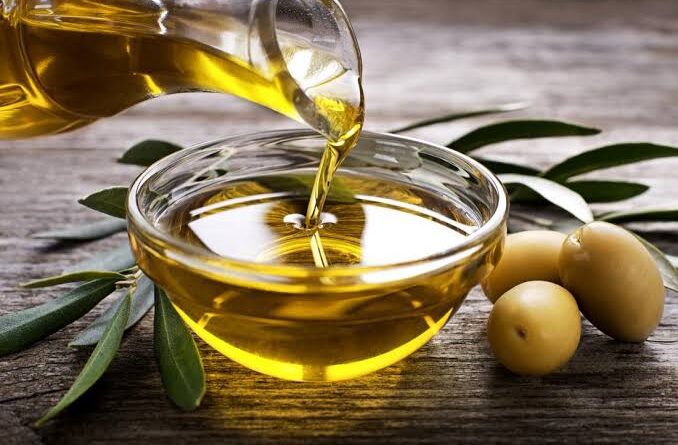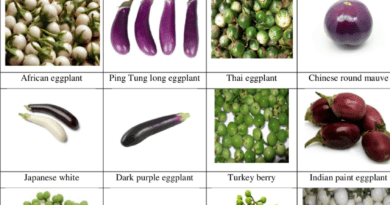Guide on Olive Oil Processing, Health Benefits and Uses
Olive oil processing is the industrial process of extracting oil from olives, which involves several stages including washing, crushing, mixing, pressing, and separating the oil from the solid residue.
Olive oil is a type of oil that is obtained from the fruit of the olive tree, which is native to the Mediterranean region. It is commonly used in cooking and has many health benefits.
Olive oil is rich in monounsaturated and polyunsaturated fats, which are considered healthy fats because they can help reduce bad cholesterol levels and lower the risk of heart disease.
In addition to its health benefits, olive oil is also known for its culinary versatility. It can be used for frying, sautéing, and baking, and is commonly used as a salad dressing or as a dip for bread.
There are different types of olive oil, with varying levels of purity and flavor. Extra virgin olive oil is considered the highest quality and is made from the first pressing of the olives, while lower quality oils may be made from subsequent pressings or a blend of oils.
Additionally, olive oil is a healthy and versatile ingredient that can be used in a variety of dishes and cooking methods.
Read Also: Astilbe Flowers – All you need to know
Olive Oil Processing Guide
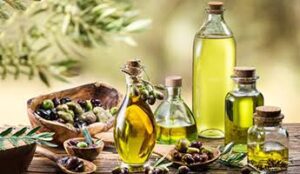
The process can be done through traditional or modern methods, with variations in temperature, timing, and equipment used. The resulting oil can be categorized based on its acidity level and quality, and can be further processed or packaged for consumption or commercial use.
Below is a complete guide to olive oil processing with proper explanation of the processes involved:
Harvesting: Olives are harvested in the fall when they are fully ripe. Hand picking is the traditional method but nowadays, machines are commonly used. The olives are carefully picked and put in containers to avoid damaging the fruit.
Washing: The olives are washed to remove any dirt, leaves, or other debris. This is done using clean water in order to avoid contamination.
Crushing: The olives are crushed into a paste using a mechanical press or a grinding mill. This process breaks down the cells and releases the oil. The paste is usually formed in a circular basin made of stone or steel.
Mixing: The olive paste is mixed to help distribute the oil evenly and promote the coalescence of oil droplets. This is done to make sure that the oil can be easily extracted later on.
Pressing: The paste is pressed to extract the oil. Traditional methods involve using a hydraulic press to apply pressure to the paste. Modern methods often use a centrifuge to separate the oil from the solids. During the pressing process, the temperature is carefully monitored to prevent degradation of the oil.
Separating: The oil is separated from the solids and any remaining water. This can be done through gravity separation, centrifugation, or filtration.
Gravity separation involves letting the oil and water separate naturally. Centrifugation uses centrifugal force to separate the oil from the water. Filtration involves using a filter to separate the oil from the solids and water.
Quality control: The resulting oil is tested for acidity, flavor, and color to determine its quality. The acidity level is measured by titration and is used to determine the grade of the oil. Flavor and color are assessed through sensory evaluation by trained tasters.
Packaging: The oil is packaged for distribution and sale. It is usually bottled in dark glass containers to protect it from light, which can cause degradation of the oil. Proper labeling and storage conditions are important to ensure the quality and safety of the oil.
Additionally, olive oil processing can vary depending on the method used, but the goal is to extract high-quality oil from the olives while preserving their flavor and nutritional value. Proper harvesting, washing, crushing, mixing, pressing, separating, quality control, and packaging are all essential steps in the process.
Health Benefits of Olive Oil
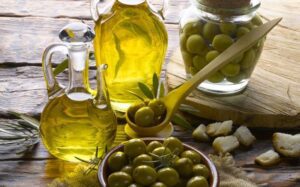
Olive oil has numerous health benefits, including:
Heart Health: Olive oil is rich in monounsaturated fats and antioxidants, which can lower bad cholesterol (LDL) levels and reduce the risk of heart disease.
Cancer Prevention: The polyphenols in olive oil have been found to have anti-cancer properties, particularly in relation to breast, colon, and prostate cancers.
Brain Function: Olive oil is high in healthy fats and antioxidants, which have been shown to improve cognitive function and reduce the risk of age-related cognitive decline.
Anti-inflammatory Properties: Olive oil contains compounds that have been shown to have anti-inflammatory effects, which can help reduce the risk of chronic diseases such as arthritis, diabetes, and cancer.
Skin Health: Olive oil has been used for centuries as a natural moisturizer and has been found to have anti-aging properties due to its high antioxidant content.
Digestive Health: The monounsaturated fats in olive oil have been found to help improve digestion and reduce the risk of digestive disorders such as acid reflux and ulcerative colitis.
Weight Management: Olive oil has been found to be effective in promoting weight loss, particularly in combination with a healthy diet and exercise.
Overall, incorporating olive oil into your diet has numerous health benefits and is a simple way to improve your overall health and well-being. However, it’s important to remember that olive oil is high in calories, so it should be consumed in moderation.
Read Also: Balloon Flowers – All You Need to Know
Uses of Olive Oil

Olive oil has a wide range of uses, including:
Cooking: Olive oil is commonly used for cooking due to its high smoke point and its ability to enhance the flavor of dishes. It can be used for sautéing, grilling, baking, frying, and more.
Salad Dressings: Olive oil is a popular ingredient in salad dressings, as it adds flavor and nutrition to the dish. It can also be used as a simple dressing on its own, with a sprinkle of salt and pepper.
Dips and Spreads: Olive oil can be used as a base for dips and spreads, such as hummus or baba ganoush. It adds flavor and nutrition to the dish, and can also help to emulsify the ingredients.
Skincare: Olive oil is a popular natural ingredient in skincare products due to its moisturizing and antioxidant properties. It can be used as a facial moisturizer, body oil, or as an ingredient in homemade skincare products.
Haircare: Olive oil can be used as a natural conditioner for hair, as it can help to moisturize and strengthen hair strands. It can also be used as a treatment for dry or damaged hair.
Cleaning: Olive oil can be used as a natural cleaning agent for household items, such as leather furniture or stainless steel appliances. It can help to remove dirt and grime while also conditioning the surfaces.
In addition, olive oil is a versatile ingredient that can be used in many different ways. Its health benefits and delicious flavor make it a popular choice in cooking and a variety of other applications.
Economic Importance of Olive Oil
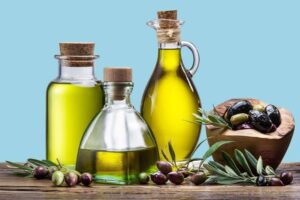
Olive oil has significant economic importance, both domestically and internationally. Below are some of the key factors:
Production: Olive oil production is a major industry in many countries, including Spain, Italy, Greece, Turkey, and Tunisia. In 2020/2021, the world production of olive oil was estimated at 3.2 million tons, with Spain being the largest producer, followed by Italy and Greece.
Exports: Olive oil is a major export for many countries, particularly those with a strong production industry. Spain is the largest exporter of olive oil, followed by Italy and Greece. In 2020/2021, the global export of olive oil was estimated at 908,000 tons.
Employment: The production of olive oil supports many jobs across the value chain, including farming, processing, and distribution. In some regions, it is a major employer and source of income.
Tourism: Olive oil production and related activities, such as tastings and tours, can also support local tourism industries. This can provide additional economic benefits for regions with a strong olive oil industry.
Health Benefits: The health benefits of olive oil, such as its positive effects on heart health and brain function, can also have economic benefits by reducing healthcare costs and increasing productivity.
Overall, the economic importance of olive oil is significant, with a strong production and export industry supporting jobs and providing economic benefits for many countries. Its health benefits and versatility also make it a valuable commodity.
Read Also: Planning Ahead with Final Expense Insurance

